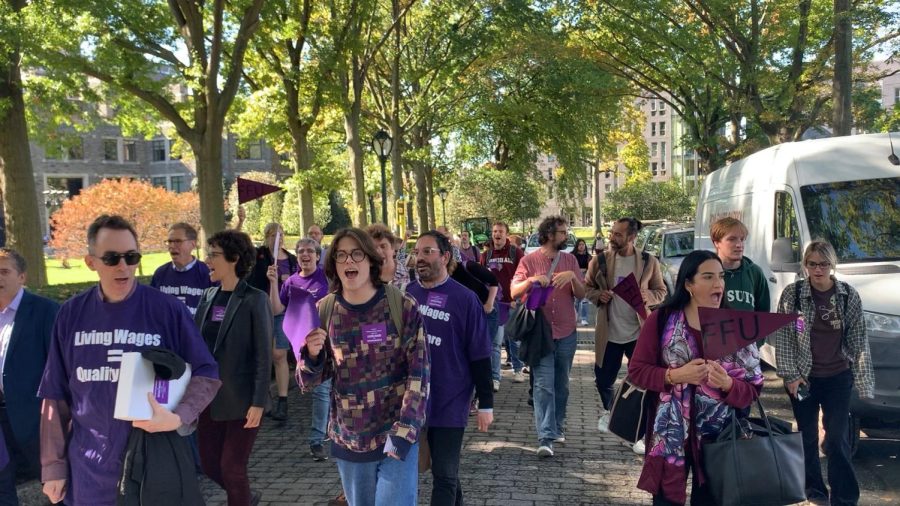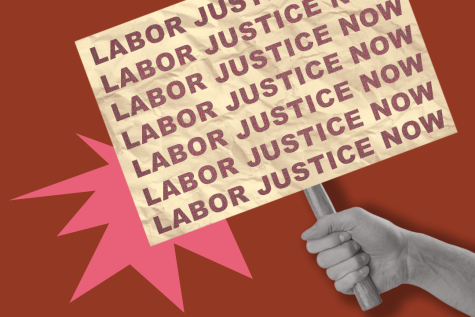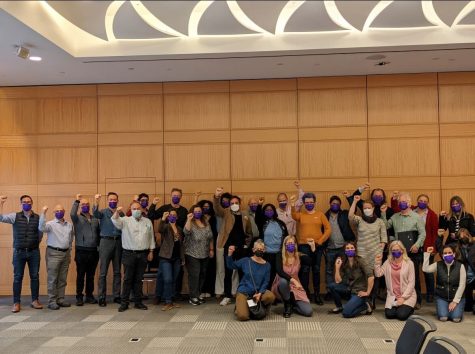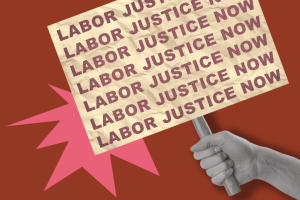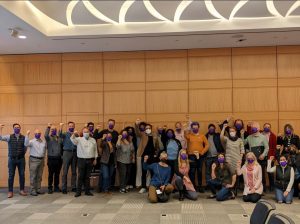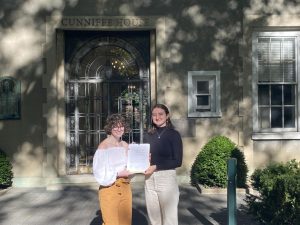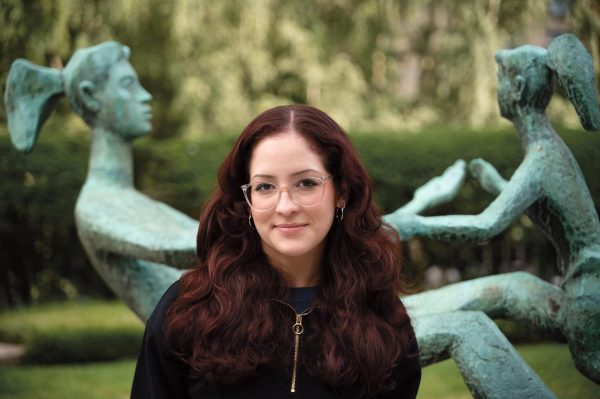Faculty Union Calls Off Strike
The three-year contract secures improved working conditions such as higher wages and a health benefit for nontenure-track faculty
COURTESY OF DIANE GEORGE
FFU members and allies gathered for a rally during Tetlow’s inauguration to advocate for better working conditions.
January 21, 2023
UPDATE: This article was originally published prior to the ratification of the tentative agreement. On Feb. 2, FFU announced via an Instagram post that the tentative agreement was ratified in a 200-6 majority vote.
Fordham University and Fordham Faculty United (FFU), the union representing nontenure-track professors at Fordham, reached a tentative three-year contract agreement on Jan. 18 after months of negotiations that began in March 2022. The tentative agreement came just twelve days before union members were set to strike on Jan. 30.
The university accepted the terms of the latest contract proposal presented by the union that calls for increased compensation per course, the provision of a health benefit for adjunct professors and reduced pay disparities between schools at the university. The tentative agreement does not achieve complete pay parity as the union had originally proposed when negotiations began.
The contract is now pending ratification by union members through a majority vote and a vote of approval by the university’s board of trustees. Union members will no longer strike and form a picket line on Jan. 30 as they had planned if the university did not accept the terms of FFU’s proposal.
“We were shocked that we got it. I was very very surprised.” Diane George, co-chair of FFU and adjunct professor at the department of sociology and anthropology
Following the ten months of negotiations, Diane George, co-chair of FFU and adjunct professor at the department of sociology and anthropology, characterized the union’s second contract as an “important stepping stone” for the working conditions of nontenure-track faculty.
“It is not what we had hoped to get when we went into negotiations in the spring; it’s much better than we thought we were going to get,” George said. “We were shocked that we got it. I was very very surprised.”
In a Fordham News press release from Jan. 19 announcing the tentative agreement reached by the two parties, the university stated that it “sought to balance the needs” of adjunct faculty members against the costs to students and families.
“We are grateful to the union leadership and our colleagues for the power of their moral arguments and above all, for their contributions to our students,” University President Tania Tetlow, J.D., said in the release.
Melanie Knuts, an adjunct professor at the Graduate School of Social Service (GSSS), said that she believes the university administration reached an agreement with FFU following the “swelling of support” from community members.
Melanie Knuts, an adjunct professor at the Graduate School of Social Service (GSSS), said that she believes the university administration reached an agreement with FFU following the “swelling of support” from community members.
“The administration’s strategy to remain rigidly nonnegotiable over fair salary increase (especially in the light of inflation), health insurance for adjuncts, and pay parity across Fordham schools over these past 10 months—until this 11th hour in our bargaining–has allowed FFU to build a momentum in its ‘people power,’” Knuts said.
In response to the tentative agreement, Devauntae Norman, Fordham College at Rose Hill (FCRH) ’26, said that he is happy that the university and union were able to avoid a strike. He added that he believes the university administration still needs to continue providing support for faculty members.
“It’s kind of unfortunate that it had to come to this point of us having to go out and strike for the professors and the faculty to get what they deserve,” Norman said. “Not all professors are going to be the best and nicest, but every professor deserves equal treatment.”
The tentative agreement does not achieve pay parity among schools. Adjunct faculty members with zero to three years of experience at the College of Arts and Sciences will see an increase in compensation per course from $7,000 to $8,500 over the course of three years.
Under the new contract, adjunct faculty members at GSSS with a master’s degree and zero to three years of experience will see an increase from $4,900 to $6,900 over the course of three years. Those with a doctoral degree and the same amount of experience will see an increase from $5,400 to $7,400.
Under the new contract, adjunct faculty members at GSSS with a master’s degree and zero to three years of experience will see an increase from $4,900 to $6,900 over the course of three years. Those with a doctoral degree and the same amount of experience will see an increase from $5,400 to $7,400.
At the Graduate School of Religion and Religious Service, adjunct instructors saw similar increases, but compensation at both schools will continue to fall short of that at the College of Arts and Sciences and others.
“As long as GSSS adjuncts suffer this gross pay disparity, Fordham communicates that our GSSS adjunct teaching is worth-less, our GSSS students are worth-less, the work we do and the skills we have as social workers are worth-less, and our contributions to Fordham and society are worth-less,” Knuts said.
George explained that because second contracts are much harder to negotiate than first contracts, she is “pleased” with the achievements gained by the union but also highlights that the agreement falls short of pay parity among schools at the university.
Equal compensation for all adjunct faculty members was initially proposed at the beginning of negotiations, but by the tail end of negotiations, it had been compromised. According to information compiled by FFU, the union decreased the average compensation per course for adjunct faculty members at GSSS by 39.3% and 43.4% for those at GGSR.
“For me at this point, personally, it does not reach pay parity, and that is a huge problem for a Jesuit university that claims to uphold social justice,” George said.
The tentative contract also includes a health benefit for adjunct instructors based on the number of courses they taught the previous semester. FFU was unable to negotiate a health insurance policy, but the university administration and union agreed on the provision of a flexible spending account (FSA), an account of nontaxable, employer-contributed funds that can be spent on health expenditures like copays and prescriptions. The funds from an FSA cannot be used on health insurance premiums, which can cost hundreds of dollars a month.
Adjuncts who taught one class in the previous academic year receive $300, those who taught two receive $400, and those who taught three or more classes receive $500.
“The concept of healthcare for adjuncts is now in contract and that is a huge step,” George said.
George shared that she did not expect to learn of the university’s acceptance of the union’s contract proposal on Jan. 18, but says it’s good news faculty members will not have to strike.
“You know obviously no one wants to strike. It’s a lot of work. It’s risky for us because we can lose pay,” George said. “Ultimately the university has the right to replace us if they want to do that because the labor laws are not really in our favor on the question of replacement workers, so we were taking huge risks and people were committed to doing that and we were ready to do it.”
“This has been possible thanks to the voices of students, tenured and tenure-track colleagues, and parents who joined ours when ours were becoming discouraged” Alessia Valfredini, Italian program coordinator director of the language program in the department of modern languages and literature
Prior to the tentative agreement, Alessia Valfredini, Italian program coordinator director of the language program in the department of modern languages and literature, and a senior lecturer teaching Italian, expressed that as she kept up with contract negotiations throughout the summer and fall of 2022, she felt as though the administration had “no good will to move forward.”
After finding out about the tentative contract agreement, Valfredini noted that she was glad the administration had responded to the unions call to “live up to our institutional values,” but hopes that there will be further gains toward pay parity between schools and healthcare access.
“This has been possible thanks to the voices of students, tenured and tenure-track colleagues, and parents who joined ours when ours were becoming discouraged,” Valfredini said. “They really showed how much they value the work we do and our investment in the university community.”
One student, Brian Tong, FCLC ’26, felt that it was “ridiculous” that the state of contract negotiations had resulted in preparations to strike. He added that the university keeping Fordham community members informed about the working conditions of nontenure-track instructors is an important step for initiating change.
“I don’t see them as just professors; because at the end of the day they’re also people. Sometimes we forget that other than playing a role as our instructors, they also provide a lot of outside value with their life experiences and various backgrounds” Brian Tong, FCLC ’26
“I don’t see them as just professors; because at the end of the day they’re also people. Sometimes we forget that other than playing a role as our instructors, they also provide a lot of outside value with their life experiences and various backgrounds,” Tong said. “Our professors are human and I think understanding that greatly impacts how myself and other students feel toward the necessity of fairer pay and working conditions for them.”
Anna Levy, who joined Fordham’s Institute of International Humanitarian Affairs (IIHA) in 2018 and taught at Fordham until 2022, says that she has been impressed by the recently elected leadership at the union.
“They very quickly organized to strike, to put enormous pressure on the university, to signal and flag that the way the process had been working in the spring, just wasn’t going to work like that anymore,” Levy said.
Levy, who is now teaching as an adjunct associate professor of public service at New York University (NYU), described a difficult and mentally taxing experience as an adjunct instructor at Fordham when sustaining injuries for which she had no access to any employer-contributed health benefits.
FFU joins faculty unions at NYU, The New School and Barnard College, all of which have negotiated contracts for adjunct and contingent faculty members since 2022.
“I remember going home and thinking to myself, well I can’t go to my emergency room because I don’t know what the bill is going to be, I don’t earn enough to cover variable bills like that. I went home, I iced it and went to sleep,” Levy said. “I woke up in the morning and blacked out on my kitchen floor. I woke up a minute or two later and went to urgent care, still nervous about the cost. They told me I had a fractured rib.”
After hearing about the contract agreement, Levy expressed that it was the beginning of what FFU can achieve moving in the future.
“I’m happy to see that there’s now health insurance on the table, I’m happy to see that parity among schools is closer,” Levy said of the new agreement. “Adjuncts, at the point where their labor keeps the whole operation running, should be valued as such.”
FFU joins faculty unions at NYU, The New School and Barnard College, all of which have negotiated contracts for adjunct and contingent faculty members since 2022.
“It is a time for unprecedented support for labor,” said George of unionization organizing and efforts across the U.S. In the New York metropolitan area, other faculty unions currently in negotiations are looking towards union achievements like that at Fordham.
Velina Manolova, an adjunct professor at Pratt Institute and NYU, says there is an important ongoing reform movement as multiple faculty unions in the New York metropolitan area continue to negotiate contracts. At Pratt, adjunct faculty haven’t received a raise since 2019 and are currently negotiating their own contract.
“A good school needs good professors,and good professors are going where the pay is.” Kate West, GSAS ’23
“Universities would not run without adjunct faculty. They would not run without faculty, period,” Manolova said of the proliferation of union organizing across the city. “That’s a very important reminder to keep sending to these university administrations.”
In a no-scab pledge, over 1,000 professors at different New York metropolitan area colleges and universities have vowed to not replace striking instructors. The pledge, which includes signatures from Fordham professors, is a show of solidarity that Manolova said “sends a clear message that now is the time for change.”
Kate West, Graduate School of Arts and Sciences ’23 and one of the students that presented a student letter of support to Tetlow’s office the office of Tetlow in October, said that if Fordham wants to stay a competitive school in the New York metropolitan area, it must put in the efforts toward those working in academia.
“A good school needs good professors,” West said, “and good professors are going where the pay is.”
Tong said that as a student, he will also continue to advocate for his professors and help his peers stay updated on recent faculty union developments and how his peers can get involved.
“At the end of the day our professors work tirelessly and deserve so much more than they are currently and will be receiving,” Tong said.
FFU will hold a vote on whether or not to ratify the agreement from Jan. 26 through Jan. 30. The Observer will post an update to this article when the vote has been determined.
Dante Alejo, Maryam Beshara and Tony Wu contributed reporting to this story.

